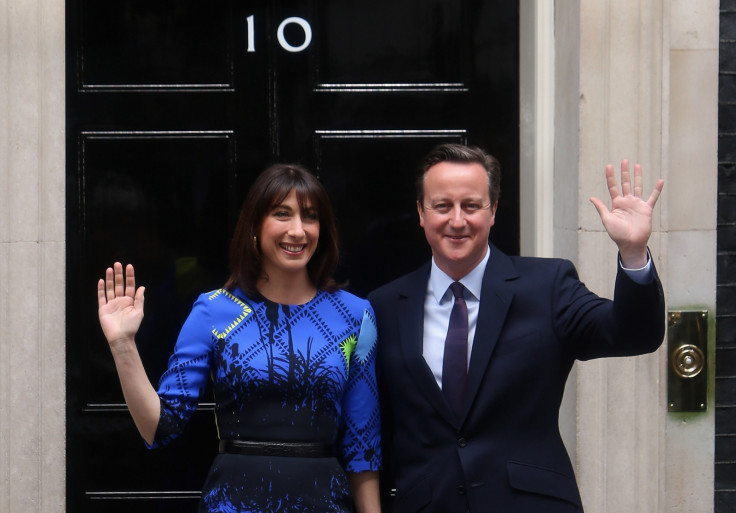Election 2015: David Cameron back in 10 Downing Street after historic Conservatives victory

David Cameron is back in 10 Downing Street after securing a Conservative majority at the general election.
He earlier arrived at Buckingham Palace for an audience with the Queen where he informed the monarch he has the mandate to form a government.
The Conservative leader and his wife Samantha made the short journey from Downing Street shortly before 12.30pm.
His meeting with the Queen lasted approximately 20 minutes before he returned to Downing Street to address the awaiting media.
The Conservatives have swept to power after an extraordinary election night that confounded pundits, pollsters and analysts and left Labour and the Liberal Democrats in tatters.
Ed Miliband stood down as Labour leader after his closest political ally and the architect of his economic policy, Ed Balls, lost his seat and the party was decimated in Scotland, where it lost all but one of its MPs to the Scottish National Party (SNP).
Nick Clegg resigned as leader of the Liberal Democrats after seeing the party lose all but eight of its seats, including the loss of major figures such as Danny Alexander, Simon Hughes, Vince Cable, Charles Kennedy, Ed Davey, Lynne Featherstone and David Laws.
Hughes and Kennedy had held their seats - Bermondsey and Ross and Skye and Lochaber - for more than 30 years, while Alexander was a main architect of the 2010 deal with the Conservatives that so damaged the Liberal Democrats.
A shock series of results saw Labour wiped out in Scotland and shadow foreign secretary Alexander losing his seat to a 20-year-old student, Mhairi Black, in Paisley as part of a SNP surge that saw it win all but three of the 59 seats north of the border.
Miliband resigned in the wake of the crushing defeat that saw Labour not only lose heavily in Scotland but fail to secure all but a fraction of the marginal seats that had been targeted during a frenzied campaign.
Cameron gave a confident and centrist speech at his own count in Witney before he headed to London where he addressed Tory HQ.
There were major casualties on the Tory side also, with Employment Minister Esther McVey losing her seat in the Wirrall, but most estimates had the Conservatives set to secure a slim majority that will enable Cameron to form a government.
The results are sure to intensify debate over Britain's first-past-the-post system.
Douglas Carswell, Ukip's first elected MP, spoke in his victory speech about the fact that his party and the Greens attracted five million votes but have only two seats, while the SNP got around 1.5 million votes and more than 50 seats.
Questions were raised about polling that consistently claimed that the race between the Conservatives and Labour was too close to call. Even on 6 May, the last polls had barely a cigarette paper between them when it came to polling figures.
In the UK, Professor Tim Bale, the chair of politics at Queen Mary, University of London, told Australia's ABC: "It's really hard to believe that so many of them have been so wrong for so long. We had 11 polls come out over the last couple of days, all of which show the parties, Labour and Conservative pretty much neck and neck.
"The pollsters are really going to have to go back to the drawing board and think about what went wrong unless there was some kind of massive late swing towards the Conservatives and I guess, you know, research might show whether that was the case or not."
© Copyright IBTimes 2024. All rights reserved.






